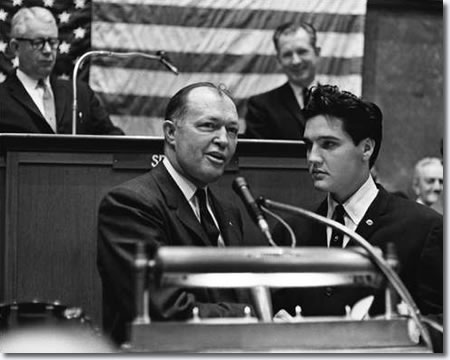Buford Ellington
Earl Buford Ellington (* June 27, 1907 in Lexington, Mississippi, † April 3, 1972 in Boca Raton, Florida ) was an American politician and the 47th and the 49th Governor of the State of Tennessee.
Early years
Originally wanted Buford Ellington in Jackson, Mississippi study theology, but what he was forced to retire due to financial reasons. As a result, he earned his money among other things as a salesman of agricultural machinery in Memphis. Later he settled in Marshall County, Tennessee, where he operated a store and a farm.
Political career
Ellington was a member of the conservative wing of the Democratic Party. Belonged to this faction in the 1940s and the influential ex-mayor of Memphis, Edward Crump, Governor Jim Nance McCord and later Governor Frank G. Clement. In 1946 Ellington appeared as campaign workers for Joe L. Evins, who ran for a seat in the U.S. Congress. In 1948, he was himself elected to the House of Representatives from Tennessee.
In the next few years his career was closely linked with that of Frank Clement, in 1952 he supported this even in his campaign for the office of governor. Clement appointed him as agriculture minister his government ( Commissioner of Agriculture). He held from 1953 to 1958 this office. 1958 Clement was allowed because of a tenure clause in the Constitution no longer a candidate. He now operational Ellington's candidacy and supported this in its successful campaign. Four years later repeated the same with the opposite sign. Ellington was not allowed to run, but Clement was re-elected. In this way, the two men ruled for 18 years as Tennessee governors. Clement had held the office from 1953 to 1959 and from 1963 to 1967 held while Ellington was from 1959 to 1963 and again from 1967 to 1971 governor.
Although both men complemented well and essentially operate the same policy, they also had their opposites. While Clement in 1960 supported the candidacy of John F. Kennedy, would have preferred if his personal friend of Lyndon B. Johnson would have become Democratic presidential candidate Ellington. At times, the relationship with Clement was also tense. While Clements 's second term Ellington worked for the Ascended after Kennedy's assassination President Johnson. As Governor, he pursued a similar policy as Clement. He promoted the road construction and education, and he was not as strongly opposed to the death penalty as Clement. The anti - evolution law, which had once been introduced in the 1920s by Governor Austin Peay, was lifted. Now the theory of evolution could be taught again in schools. Ellington also liberalized the alcohol laws anything.
Initially, Ellington was to be very conservative on the issue of civil rights. Over time he became more moderate. Finally, he joined the civil rights policies of President Johnson. With H.T. Lockhart was an African-American member of a government in Tennessee for the first time. The change of heart by a conservative supporter of racial segregation at a moderate politician for that time reflected a general trend. As 1968 Martin Luther King was assassinated in Memphis, the governor responded prudently and could prevent major riots in Tennessee. Ellington was a respected governor in his time. He has at times been chairman of the National Governors Association and the Council of Governors of the Southern States.
End of life and death
After the end of his second and final term in January 1971 it was only a little more than a year. He died in April 1972 in Boca Raton in Florida during a golf game. Buford Ellington was married to Catherine Cheek, with whom he had two children.










